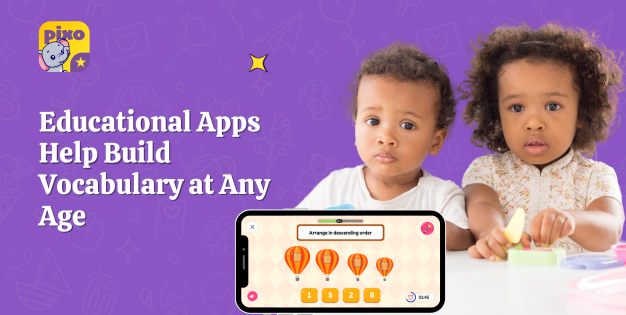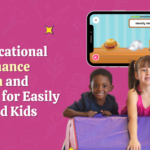Your toddler points to a flower and says, “Pretty!”—your heart melts. Then they add, “It’s a daisy!” Wait, what? Watching little ones discover words and express themselves is one of the joys of parenting. But let’s be honest: getting from “goo goo” to “daisy” takes some creativity and patience.
That’s where Play pixo comes in. By turning learning into play, it helps your child pick up new words effortlessly, expanding their vocabulary while having fun. Because when learning feels like playtime, magic happens.

Why Does Vocabulary Matters?
A rich vocabulary does more than improve communication. It’s a cornerstone of cognitive development. For young learners, words are the building blocks of thought. The more words they know, the better they can describe their world, express emotions, and understand new concepts.
For older kids and even adults, a growing vocabulary boosts confidence, reading comprehension, and critical thinking. Whether it’s acing a test, writing an essay, or nailing a job interview, strong words lead to sharp minds.
The Role of Educational Apps in Vocabulary Building
Traditional methods like flashcards and worksheets are effective, but they can feel repetitive. Educational apps bring vocabulary to life with interactive games, stories, and challenges that make learning fun and engaging.
Here’s why these apps stand out:
- Interactive Learning: Games and puzzles keep kids engaged while reinforcing new words in meaningful contexts.
- Customizable Content: Apps can adapt to different ages and skill levels, ensuring every learner is challenged but not overwhelmed.
- Gamified Rewards: Points, badges, and achievements keep motivation high.
- Convenient Access: Learning happens anywhere—at home, in the car, or during screen time.

How Play pixo Makes Vocabulary Building Fun?
When it comes to educational apps, Play pixo isn’t just another learning tool—it’s a parent’s secret weapon for combining fun, education, and meaningful growth. Play pixo blends interactive games with skill-building activities, making vocabulary learning exciting and productive for kids of all ages.
For Toddlers and Preschoolers:
Play pixo introduces little learners to new words through fun matching games, simple puzzles, and vibrant visuals. This approach is rooted in the same principles of play-based learning that make early childhood education so effective, blending interactive activities with skill development in a way that feels natural for young minds.
By focusing on playful engagement, it mirrors the strategies used to make preschool learning both enjoyable and impactful, as seen in approaches tailored for younger learners.
For Older Kids:
Story-based activities, problem-solving tasks, and creative challenges make learning feel like an adventure. Kids aren’t just memorizing words; they’re using them in context, fostering critical thinking and creativity.
For Parents:
Play pixo offers something unique—a performance tracking system. Parents can monitor their child’s progress across key traits like resilience, focus, engagement, and confidence. Did your child tackle a particularly tricky puzzle? Did they stay engaged through a challenging word game? With Play pixo, you’ll see it all, giving you meaningful insights into their growth.
And because Play pixo operates in a safe, ad-free environment, you can feel confident knowing your child is learning in a space that prioritizes their well-being.
With Play pixo, every word becomes a stepping stone to sharper thinking, stronger communication, and greater confidence—for kids and parents alike.

Tips for Parents to Support Vocabulary Growth
Read Together: Books are the ultimate vocabulary builders. Even just 15 minutes of reading a day introduces kids to new words and ideas.
Make Conversation a Habit: Narrate your day, ask open-ended questions, and encourage kids to describe what they see or feel.
Play Word Games: Games like Scrabble or crossword puzzles aren’t just fun—they’re great for expanding vocabulary.
Incorporate Apps Like Play pixo: Use screen time wisely by choosing apps that align with your child’s learning goals.
Celebrate New Words: Create a “word of the day” challenge and reward your child for using it in conversation.
FAQs About Vocabulary Building
1. Can vocabulary apps replace traditional learning methods?
While apps are a fantastic supplement, they work best alongside activities like reading, conversation, and hands-on play. Think of them as a valuable tool in your learning toolkit.
2. How can I choose the right educational app for my child?
Look for apps that are age-appropriate, ad-free, and offer interactive, engaging activities. Reviews and recommendations from other parents can also be helpful.
3. What are some signs my child is improving their vocabulary?
You’ll notice your child using new words in conversations, asking about unfamiliar terms, and showing greater interest in reading or storytelling.
4. Can older kids and teens benefit from vocabulary apps?
Absolutely! Apps tailored for older learners often focus on advanced vocabulary, language skills, and creative writing, helping teens excel in school and beyond.
5. How often should my child use an educational app?
Consistency is key. Even 10–15 minutes a day can make a noticeable difference. The goal is regular, meaningful engagement rather than long sessions.
Conclusion
Building a strong vocabulary is a lifelong journey, and with the right tools, it can also be an exciting adventure. Educational apps like Play pixo make learning accessible, engaging, and fun for all ages, turning screen time into skill time.
Whether your child is just starting to speak or exploring the nuances of language, every new word is a step toward sharper thinking, clearer communication, and greater confidence. So, let’s make every word count—because when kids learn to love words, the possibilities are endless.
Last modified: December 10, 2024









